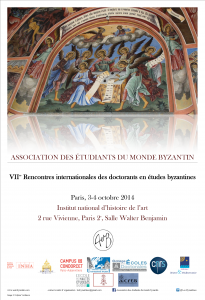3-4 octobre 2014
Institut National d’Histoire de l’Art (Paris)
Vendredi 3 octobre
9h Accueil
———-Séance I – Économie et commerce à Byzance à l’époque tardo antique———-
9h30 MARANI Flavia (EPHE et Université de Pise), « La circulation monétaire dans le Latium méridional du royaume ostrogoth à la reconquête byzantine » — Résumé
10h DRAPELOVA Pavla (Université d’Athènes), « Coins as a Source of Information on a Provincial City : the Case of Antioch (6th century) » — Résumé
10h30 REY Sylvain (Université Paris I Panthéon-Sorbonne), « Le commerce tardo-romain dans l’océan Indien : le rôle de l’Arabie (IIIème – VIIème siècles) » — Résumé
11h00 Pause
11h30 KOROSIS Vassileios (Université d’Athènes), « Les artisans appelés banausoi dans la préfecture d’Illyricum pendant l’Antiquité Tardive (IIIème – VIIème siècles ap. J.-C.) selon les données archéologiques et les sources primaires » — Résumé
12h LAMESA Anaïs (Université Paris – Sorbonne), « Les monuments rupestres de Cappadoce : de l’étude d’une pratique à la compréhension d’une société » — Résumé
12h30 JUGÃNARU Andra (Central European University, Budapest), « Men, Women, and the Angelic Life : Double Monasteries in Late Antiquity » — Résumé
13h PEPPA Aikaterini (Université Paris I Panthéon-Sorbonne), « Recherches sur l’économie de la ville de Philippes à la fin de l’Antiquité Tardive » — Résumé
13h30-14h30 Déjeuner
——————–Séance II – Livre et littérature à l’époque médio-byzantine—————-
14h30 ROUQUETTE Maïeul (Université de Lausanne et Université d’Aix-Marseille), « Les apôtres dans la Souda » — Résumé
15h RĂDUCAN Ana-Maria (Université de Bucarest), « Le Cantique des Cantiques et le discours mystique de saint Syméon le Nouveau Théologien » — Résumé
15h30 Pause
16h VUKAŠINOVIĆ Milan (EHESS et Université de Belgrade), « The Authors and Their Families in Two Early 10th Century Byzantine Texts » — Résumé
16h30 SGANDURRA Mariafrancesca (Università degli Studi di Roma Tor Vergata), « L’histoire d’un livre liturgique de l’Église byzantine : le Pentecostaire » — Résumé
17h30 Assemblée générale de l’Association des étudiants du Monde byzantin (AEMB)
Samedi 4 octobre
9h Accueil
———-Séance III – Société byzantine et vie intellectuelle du XIIème au XVème siècle——–
9h30 JOUETTE Jean-Cyril (Université d’Aix-Marseille), « Les astrologues, les devins, les magiciens et la guerre (IXème – XIIème siècles) » — Résumé
10h ROSKILLY Jack (Université Paris I Panthéon-Sorbonne et Université de Vienne), « Les correspondants des évêques : du réseau relationnel aux échelles de pouvoir » — Résumé
10h30 TRANCHINA Antonino (Université de Rome – La Sapienza), « Middle-Byzantine Phialai : a Preliminar Survey, from Constantinople to Provincial Areas » — Résumé
11h00 Pause
11h30 PARLIER Matthieu (Université Lyon 2), « Filiations et continuité de l’État dans les éloges impériaux sous les premiers Paléologues » — Résumé
12h KOUVARAS Konstantinos (Université d’Athènes), « La contribution catalytique des ascètes hésychastes à la formation du phychisme de la société byzantine au cours de la seconde moitié du XIVème siècle » — Résumé
12h30 JOVANOVIĆ Jelena (Université de Rome – La Sapienza), « Power, Ideology and Identity : Monastic Foundations in the Late 13th Century. Examples of Architectural Commission in the Serbian Medieval State » — Résumé
13h-14h30 Déjeuner
————————Séance IV – L’art à Byzance aux époques tardives——————-
14h30 NESTOROVIĆ Milica (Université de Belgrade), « Secret Places or Side Story Tellers : Visual Narrative of Late Byzantine Parekklesions » — Résumé
15h NING Ye (Université Blaise Pascal, Clermont-Ferrand), « Les peintures de Novgorod du XIIIème au XVème siècle » — Résumé
15h30 Pause
——————–Séance V – Le monde byzantin perçu par l’Occident——————
16h ALEXIU Andra-Nicoleta (Université de Bucarest), « The Reception of the Byzantine World in the Writings of Hildegard of Bingen » — Résumé
16h30 KARNACHOV Alexander (Institut d’Histoire de Saint-Pétersbourg), « Latin glosses in Greek Manuscripts of the 13th-14th Centuries in St. Petersburg : a tribute to the history of Greek studies in the Middle Ages » — Résumé
17h GRASSI Giulia (Université de Rome – La Sapienza), « Byzance à Paris : l’Exposition d’art byzantin au Musée des Arts Décoratifs en 1931 » — Résumé
18h00 Bilan des VIIes Rencontres byzantines



